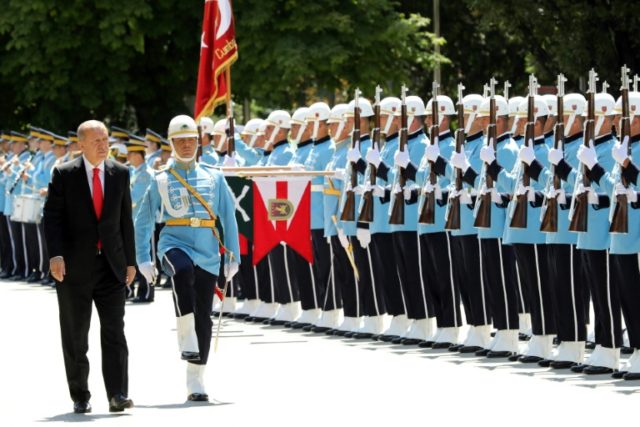The government of Turkey has yet to lift a state of emergency in place since a failed coup against President Recep Tayyip Erdoğan in 2016, despite promising to do so last Monday.
The nation’s justice minister promised Monday that the state of emergency would lift “within a few days.”
Erdoğan imposed the state of emergency, which grants him widespread executive and decree powers, after the July 15, 2016, attempted coup against him and used it to arrest, detain, or dismiss from government work over one hundred thousand people.
While campaigning for reelection before the June 24 national polls, Erdoğan promised he would lift the state of emergency if he won, arguing that the new presidential system in place would grant sufficient power to the new president to not make the state of emergency necessary. Turks voted to transition from a parliamentary to a presidential system in 2017, in a contested election that opponents say was riddled with fraud.
Justice Minister Abdülhamit Gül said in a speech Monday that the state of emergency would end soon, but warned that this would do little to restrict Erdoğan’s ability to crack down on anyone he considered an enemy to his regime.
“The state of emergency will end within a few days. However, ending the state of emergency should not be deemed as ending the struggle,” he said, according to the Turkish newspaper Hurriyet. “The fight against terrorism, the most persistent and determined fight against all kinds of terrorism, especially the Fetullahist Terrorist Organisation [FETÖ], will continue till the end.”
FETÖ is the acronym the Turkish government uses for a group that calls itself Hizmet, the Islamic organization run by U.S.-based cleric Fethullah Gülen. Erdoğan claims that Gülen’s followers organized and executed the failed coup; Gülen denies any involvement.
Gül argued that the state of emergency was ending in part because the Turkish government had completed much of its investigation into the planning and execution of the coup.
“All the investigations directly related with the coup attempt, except one file, have been completed. Some 2,161 defendants have been on trial in 94 separate files in courts,” he noted. “The trials of 195 files were completed in the first instance courts whereas the final verdicts were given in two cases after the court of cassation review. In those cases, 2,382 defendants were given sentences ranging from aggravated life imprisonment to several years of jail time.”
“Within a few days” of July 16 is significantly longer than what Erdoğan’s government promised for an end to the state of emergency. Following the president’s election—also marred by widespread allegations of fraud and extensive prohibitions on other candidates appearing on television—Prime Minister Binali Yıldırım claimed that the state of emergency would end upon Erdoğan’s inauguration, vowing, “We will issue a final decree law tomorrow” the day before.
Erdoğan was inaugurated into the presidential office on July 9, but the state of emergency continued. At the time, Yıldırım noted that if Erdoğan did not act to end the state of emergency, it would naturally end on July 18. He also claimed that Erdoğan would sign a new decree granting him many of the powers that the state of emergency does without having to impose that particular policy, though there is no indication this has occurred yet.
July 9 came and went, and by July 13 Erdoğan’s office had once again changed the date, this time promising the state of emergency would end on July 18. Spokesman Ibrahim Kalin told reporters, “The current state of emergency is coming to an end on the night of July 18. Mr. President has the will … not to extend it.”
The Turkish government, and citizens around the world loyal to Erdoğan, commemorated the failed coup on Sunday by the thousands, organizing to remember the lives of over 200 people who died on the night of July 15, after Erdoğan appeared on television and urged supporters of his Islamist Justice and Development Party (AKP) to fight back against the soldiers who had announced the coup. While the coup organizers issued a statement identifying themselves as constitutional secularists, Erdoğan insisted that those in charge were members of Gülen’s Islamic movement and has continued to target individuals in the police and military suspected of sympathies to Gülen.
Following the commemorations, Foreign Minister Mevlut Cavusoglu announced Monday that Turkey had extradited over 100 people believed to be involved with Gülen and the coup.
“We have been watching these traitors for two years and have brought the leading figures of FETO to our country. Some of these were covered by press while some others weren’t at the request of some countries. I could frankly say that more than 100 of FETO affiliates have been brought to Turkey,” Cavusoglu said, according to Anadolu.
Cavusoglu also claimed that the Trump administration had increased “mobility” in investigating Gülen and sympathizers in the country. Gülen runs an Islamic charter school network in the United States.
Follow Frances Martel on Facebook and Twitter.

COMMENTS
Please let us know if you're having issues with commenting.